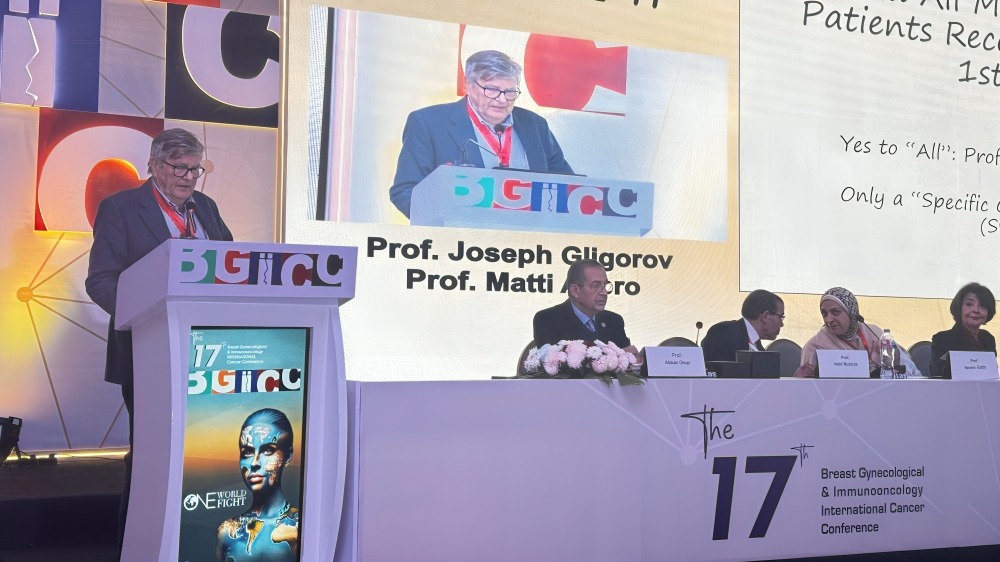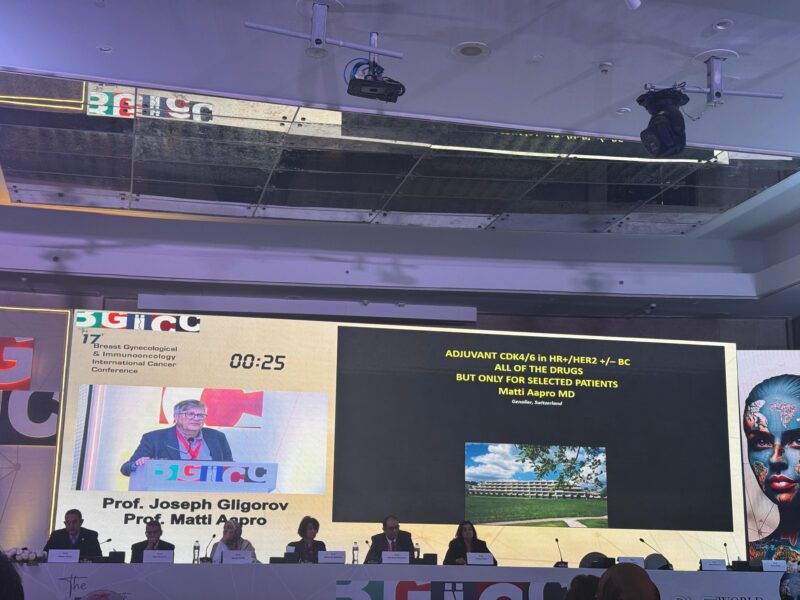
Debate Highlights Presented by Matti Aapro: Should All HR+/HER2- Metastatic Breast Cancer Patients Receive CDK4/6 Inhibitors in the First Line?
During 2025 BGICC Debate: Prof. Matti Aapro Opposes Universal Use of CDK4/6 Inhibitors
In this debate Prof. Aapro presented an opposing perspective on the universal use of CDK4/6 inhibitors (CDK4/6i) as first-line therapy for all HR+/HER2- metastatic breast cancer (MBC) patients. Drawing on emerging evidence, particularly from the SONIA trial, Prof. Aapro argued for a more selective and individualized approach.
Arguments Against Universal First-Line Use of CDK4/6 Inhibitors
1. Evidence from the SONIA Trial:
Prof. Matti emphasized the SONIA trial’s findings, which question the necessity of starting CDK4/6 inhibitors upfront in all patients. The trial demonstrated that delaying CDK4/6 inhibitor use until later lines of therapy does not significantly compromise outcomes for certain patient subgroups.
2. High-Risk vs. Low-Risk Populations:
Not all HR+/HER2- MBC patients present with the same disease aggressiveness. Prof. Matti highlighted the need to prioritize high-risk patients (e.g., visceral disease or rapid progression) for first-line CDK4/6 inhibitors while considering alternative approaches for lower-risk patients.
3. Resource Allocation and Cost Effectiveness:
The financial burden of CDK4/6 inhibitors was a key point of discussion. With healthcare systems already under strain, universal use may not be sustainable, especially in resource-limited settings. Prof. Michael argued that reserving CDK4/6 inhibitors for later lines in certain cases could improve cost-effectiveness without sacrificing patient outcomes.
4. Mature Data from Trials:
While CDK4/6 inhibitors show clear progression-free survival (PFS) benefits, Prof. Matti noted that the overall survival (OS) data in some trials is still maturing. This raises questions about whether immediate use is necessary for all patients or if sequencing treatments could be equally effective.
5. Toxicity Considerations:
Although generally manageable, CDK4/6 inhibitors are not without side effects. Prof. Matti stressed that exposing all patients to these agents upfront may lead to unnecessary toxicities in those who could achieve good outcomes with endocrine therapy alone.
Selective Use: A Balanced Approach
Prof. Matti proposed a more nuanced treatment algorithm:
- High-Risk Patients: Immediate use of CDK4/6 inhibitors in combination with endocrine therapy remains the standard.
- Low-Risk Patients: Endocrine therapy alone in the first line, with CDK4/6 inhibitors reserved for progression. This approach tailors treatment intensity to disease characteristics, avoiding overtreatment.
Conclusion
Prof. Michael concluded with a cautionary note:
“While CDK4/6 inhibitors have undoubtedly transformed the treatment of HR+/HER2- MBC, the data from trials like SONIA challenge the notion of universal use. A more personalized approach, balancing efficacy, toxicity, and cost, will ensure that these valuable therapies are used where they are truly needed.”
The debate underscored the complexity of treatment decisions in HR+/HER2- MBC and highlighted the need for ongoing research to refine patient selection and optimize outcomes.

Further Reading:
BGICC 2025: Hear from Global Oncology Leaders
Introducing the Radiology Course at BGICC 2025
Get Ready for BGICC 2025: A Global Event in Cancer Care
The 17th Annual BGICC Conference Kicks Off in Cairo, Egypt with 5,000 Attendees
Scientific Insights from Prof. Hope Rugo: Advancements in Metastatic HER2+ Breast Cancer Therapy
-
ESMO 2024 Congress
September 13-17, 2024
-
ASCO Annual Meeting
May 30 - June 4, 2024
-
Yvonne Award 2024
May 31, 2024
-
OncoThon 2024, Online
Feb. 15, 2024
-
Global Summit on War & Cancer 2023, Online
Dec. 14-16, 2023
